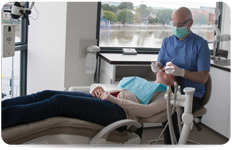Can my dentures be made tighter?
In most cases it is possible to make in improvement and in some cases to completely change the denture comfort and types of foods that can be chewed. The amount of improvement possible depends on the cause for looseness and what the most suitable treatment plan is. With the use of implants the improvements can be dramatic and life changing for some patients, particularly with lower dentures.
What options are available?
In some cases, we can improve the comfort and ease of chewing of dentures without needing to provide implants. A prosthodontist is specially trained to provide dentures that fit the shape of your mouth perfectly and this precise fit helps make them stable and comfortable. Sometimes, for people who have either had a bad experience with dentures or very little experience in wearing them, implants buried in the gum can be attached to a removable complete denture in a variety of ways. This means that the dentures move around very little if at all during eating and cause far less soreness because they’re not rubbing or pressing on the gum unevenly. Sometimes, the denture can even be fixed to the implants and are not taken out at night at all.
Which option should I get?
We always provide the simplest and most inexpensive treatment that will offer patients the comfort and ability to eat that they require. Sometimes this requires complex implant treatment and sometimes it doesn’t. Each patient is different and so the solution will be tailored to suit your individual situation, needs and budget. The decision about which option is best for you requires a thorough assessment by a specialist so that you get the most effective solution that’s represents best value for you.
Can I get rid of my dentures altogether and have a fixed solution?
This is possible in some cases, particularly for patients who have recently lost all of the their remaining teeth or are about to. The fixed alternative to complete denture involves the placement of usually 4-6 implants and the fabrication of a fixed bridge on top of these. The bridge can be made to look extremely natural and functions almost as well as natural teeth. The planning and execution of this type of case is complex and requires the input of a prosthodontist and a periodontist to make sure that the right number of implants are placed in the right positions. These things are critical to allow for predictable implant success and optimum function and aesthetics of the bridge. If the treatment is well planned and carefully carried out, this denture alternative can be very predictable in the long-term and provide excellent quality of life
Will the treatment take long?
This obviously depends on the complexity of the case but we will always progress treatment as quickly and efficiently as is advisable to do clinically. A new set of conventional complete dentures takes just a couple of months but complex implant cases can take over a year.
We never rush treatment and in particular we don’t rush implant cases. It is critical to plan this type of implant work meticulously so that the final restorations look extremely natural, last a long time and are easy to keep clean. Rushing this type of treatment can cause early implant failure and significant compromises on aesthetics that are avoidable. Correcting implants that are not well planned and placed in poor positions can be very unpleasant, time consuming and costly so we don’t take risks for the sake of slightly longer treatment times
Do you offer “Teeth in a Day”?
Yes but only in select cases where it is appropriate. This type of treatment has become very popular in recent years but is only suitable if certain, very specific circumstances arise. In order to make it as predictable as possible, it requires a significant amount of planning by a team of specialist dentists, usually a periodontist and a prosthodontist. “Teeth in a Day” is often quite expensive and very prone to being rushed and as outlined above. The clinical and financial consequences if it going wrong can be considerable. There are other ways of achieving the treatment goals of “Teeth in Day” over a slightly longer period of time but with far less long term risk.



